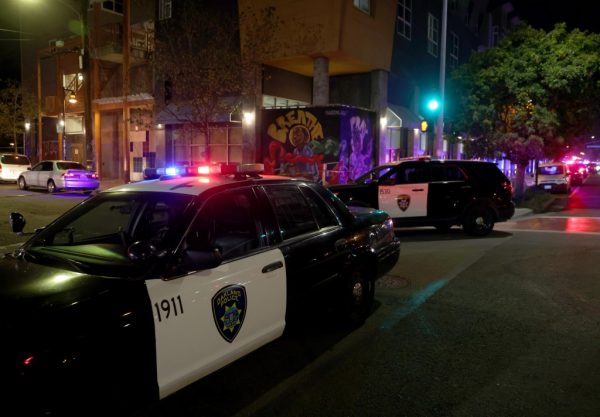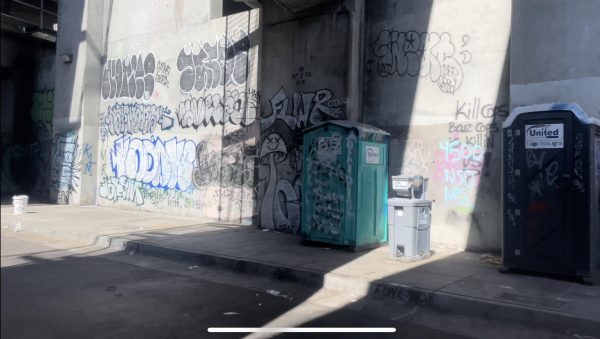Fresh start: From jail to law school
July 18, 2019
“Check the box if you have ever been convicted of a felony” is a sentence far too familiar to Antonio Reza. Whether he was applying for a job, college, housing or FAFSA, he dreaded this step in the application process. It’s a shadow that follows Reza ever since he spent time in jail on armed robbery charges back in 2012.
He was nineteen. Detective Michael Gebhardt from the Fremont Police Department arrested him that day. It was a moral error that would not only lead him to jail, but ultimately affect his life on the outside for years to come, even after he’s proven his dedication to better himself.
When Reza was released he decided to make some major changes; he decided he had hit rock bottom and was only going to go up from there. It was not an easy thing to do as he faced many obstacles upon release.
“Every time I checked the box to every job I applied, I did not get the job 100 percent of the time, but every time I lied and didn’t check the box, I got the job 100 percent of the time,” Reza said. “Now that was just in the workforce and then I see this box when I’m trying to go to school and I’m like man, I’m just trying to better myself.”
According to the National Institute of Justice, the research arm of the U.S. Department of Justice, 75 percent of former inmates are arrested again within five years of release on average. For Reza’s demographic, it is even higher at 86 percent.
Reza was determined to not become a statistic; he was set on beating the odds, although he admits he found it incredibly difficult at first. He wanted to re-enter society and have a chance at a normal life, he felt extremely discouraged and frustrated when he attempted to do so but felt rejected and overlooked when people found out about his record.
“Whether it’s in person or a job application, it’s little ways that society is telling me that I’m less than,” said Reza.
With hurdles like these, it leads one to wonder if this could be a reason the recidivism rate is so high, and a reason why jail is a revolving door for these young offenders.
“It’s really not that hard to revert to a pattern you’ve known your whole life, when doors are getting slammed in your face. It takes a lot of strength to resist that in difficult times.
“Fortunately, so many of the folks I’ve worked with have that strength,” Kim Richman, co-founder and Executive Director of Alliance For Change, said in an interview. The organization is a non-profit that helps those exiting prison have a meaningful re-entry to the community.
Often society ignores issues when it comes to people who have served time in jail. Many times, they are seen as criminals who “deserve what happens to them.” Many of these offenders do not want to go back to jail and really attempt to live a normal life, but society and the current criminal justice system make it nearly impossible.
“If they (ex-felons) served their time and paid a debt to society, they should be able to rejoin society. If we keep a never ending punishment, we are failing as a society in allowing that person to learn and grow from their mistakes,” said Reza. “I wasn’t a Saint, I deserved to go to jail but the fact that my punishment didn’t stop for many years after, that’s the part I have an issue with,” he added.
Richman believes that employers and schools should not ask if people have a record unless it is specifically relevant to the job, for instance a child molester should not work at a school, or drug addicts should not operate heavy machinery, however “for most of these, there’s really no reason for the employer to ask and use that as a way to dismiss people.” she said.
It would certainly discourage anyone to think that the only job they can get is either minimum wage or grunt work, or to not be able to get financial aid at school because of your record.
“Why is a hazardous job the only thing that’s available for me? There is also construction but why are the possibilities so limited?” said Reza.
Reza could not take the bar exam with a felony on his record, but his story does not end there. Detective Gebhardt, the officer who had arrested him, vouched for him and sent a letter of recommendation to the District Attorney to reduce his charge to a misdemeanor. Essentially he was placing a bet on Antonio that he would stay on the right path and not go back to his old ways.
“Antonio’s worth it” said Gebhardt.
Reza and Gebhardt have since remained in touch and have a friendly relationship. “He is an absolute success story,” said Gebhardt.
“There’s steps you can take to expunge your record, there’s steps you can take to reduce your felony to a misdemeanor, but I guess the easier answer would be don’t be involved in that in the first place,” he added.
Gebhardt, a detective at Fremont PD and California State University, East Bay alumnus, handles cases like Reza’s and he believes family structure and self esteem play a huge role in the recidivism rate regardless of race. More specifically, he believes that an offender in a two-parent household is less likely to go back to jail, than someone who is raised in a one parent household.
Currently there are some organizations that help ex-felons reintegrate society by helping them get jobs, coach them for interviews, and even offer assisted housing. Such organizations include the Alliance for Change, National Hire Network, Second Chance among others.
“We teach cell phone and computer classes, so they can get caught up on all of the technology they’ve missed while they were locked up. We help them with resume and cover letter writing. We provide social support,” said Richman.
Reza went on to attend Ohlone Junior College and then transfer to the University of San Francisco. At USF, he graduated as Valedictorian where he majored in Communication Studies and minored in Sociology and Legal Studies. He is also attending Santa Clara School of Law in the Fall, and is interested in getting involved in criminal justice reform, entrepreneurship and intellectual property.
“I personally thought that I had to go above and beyond just because I was a felon and I don’t think I would have tried as hard in college if I wasn’t a felon” said Reza.
Reza graduated college with a grade point average of 3.9. He has exceeded everyone’s expectations and continues to do so everyday as he has been part of various panels across the State and even out of state for criminal justice reform.
Reza is open about sharing his story in hopes that it can resonate to someone who is going through something similar.
“It would be selfish of me not to share my story…I think at least one person out there needs to hear this,” Reza said.
In the future Reza would like to give back to the community by being part of a scholarship committee or become a donor, and perhaps even teach a class at a community college. “I realize I gotta go back and pull somebody else up.”
An advice he would give to someone who finds themselves in a similar position would be to not give up.
“Even though the statistics may say it’s damn near impossible, it’s not impossible, you just gotta work your ass off.”















